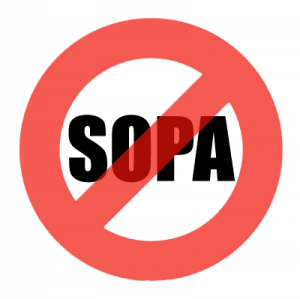 [Updated with correction on SOPA support withdrawal story.]
[Updated with correction on SOPA support withdrawal story.]
Voices in the video game industry have spoken out about the Entertainment Software Association (ESA) and its backing for the controversial Stop Online Piracy Act (SOPA).
The proposed SOPA legislation gives the U.S. government and copyright holders the authority to seek court orders against websites associated with infringing, pirating or counterfeiting intellectual property. Critics of the bill say that it creates the building blocks for a great American firewall that will curb creativity, cost jobs and curb free speech.
Major game companies Nintendo, Sony and EA reportedly removed their individual support for SOPA in the past week, but in an update, EA said that story was incorrect, because it had never expressed support for the Senate version of SOPA, but rather for something similar to it.
AI Weekly
The must-read newsletter for AI and Big Data industry written by Khari Johnson, Kyle Wiggers, and Seth Colaner.
Included with VentureBeat Insider and VentureBeat VIP memberships.
However, these companies are all still members of the ESA trade association, which is listed as a supporter of the bill. Indie game developer Nathan Fouts, behind the games Serious Sam Double D and Weapon of Choice, has urged gamers and developers to lobby the organization to drop support for SOPA. He states that “as long as the ESA is still listed [as a supporter], the game industry as a whole is supporting SOPA.”
In July 2011, the ESA won a landmark court case, which ruled that “video games are entitled to the same constitutional protections as books, movies, music and other forms of artistic expression”, under the First Amendment. The ESA also sponsors the Video Game Voters Network, an organization that unites gamers who support freedom of speech in games. Now it seems, at least to some industry figures, that the ESA is going against one of its guiding principles.
In a statement, the ESA said:
As an industry of innovators and creators, we understand the importance of both technological innovation and content protection, and do not believe the two are mutually exclusive. Rogue websites – those singularly devoted to profiting from their blatant illegal piracy – restrict demand for legitimate video game products and services, thereby costing jobs. Our industry needs effective remedies to address this specific problem, and we support the House and Senate proposals to achieve this objective. We are mindful of concerns raised about a negative impact on innovation. We look forward to working with the House and Senate, and all interested parties, to find the right balance and define useful remedies to combat willful wrongdoers that do not impede lawful product and business model innovation.
Jim Sterling, reviews editor at Destructoid.com has sent an open letter to the ESA, in which he describes its continued support for SOPA as “hypocrisy on a most despicable level,” given its previous actions to protect freedom of speech. Sterling requests that “as other companies dissolve their allegiance with this poorly written, glaringly broken bill, I ask you to do the same.“
Fouts has also written to the trade association, saying that “The ESA represents the video game industry, including companies such as Sony Entertainment and Nintendo which have dropped support for SOPA. This bill is bad for the internet and bad for the video game industry. Please show the world that the game industry does not support SOPA, and please have the ESA withdraw support.”
The letter appears in full on Fouts’ blog, and he is encouraging gamers to send similar messages to the ESA, as a show of strength by the gaming community. As he puts it, “I’ve put together a simple post pleading with developers and gamers to focus their internet super powers on getting the ESA to drop SOPA support. If they can get the Ocean Marketing guy fired forever, I’m sure they can blow this up as well.”
The ESA has 34 industry members listed on its website, including Sony Computer Entertainment, Microsoft, Nintendo, Ubisoft, Capcom, Namco Bandai and SEGA. Fouts has appealed to developers working at these companies to “talk to your higher ups about contacting the ESA, to have them withdraw SOPA support”. He says that “there are over 30 really great companies that have made amazing games that are effectively supporting the SOPA bill.”
Fouts is adamant that SOPA is not a viable solution in the fight against software piracy. He admits that “my company lost plenty of potential sales of our recent game Serious Sam Double D to online piracy.” But despite this, “SOPA is not the answer to fixing piracy problems.”
Voting on the SOPA bill has currently been delayed, but the issue is certainly not going to die down, and it will be interesting to see whether other organizations drop their support for the bill, amidst widespread protests by members of the tech community.
You can keep on top of the SOPA story by following VentureBeat’s ongoing SOPA coverage.
VentureBeat's mission is to be a digital town square for technical decision-makers to gain knowledge about transformative enterprise technology and transact. Learn More
